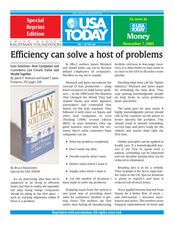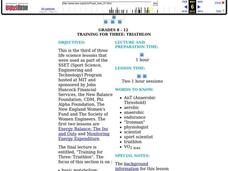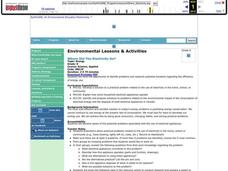Curated OER
Efficiency Can Solve a Host of Problems
Students explore the concept of efficiency. In this efficiency lesson plan, students read an article about efficiency in various industries such as health care, retail, and auto repair. Students identify a company that they think could...
Curated OER
Conservation of Energy
In this energy worksheet, students review the law of conservation of energy and how energy is transformed from one form to another. Students complete 10 matching, 10 fill in the blank, and 7 problems to solve.
Curated OER
Efficiency
In this efficiency worksheet, students use the efficiency equation to solve for useful work done by the machine (output). This worksheet has 10 problems to solve.
Curated OER
Training for Three: Triathlon
Students complete cycle ergometer test to enable them to discuss their potential in each of the three events in a triathlon. They use their own dataset to make decisions as to their abilities in each sport.
Curated OER
Power Systems and Efficiency - Nuts! Investigation
Eighth graders measure the amount of energy found in different kinds of nuts. They use different types of burners and compare and contrast the efficiency of each. They also calculate an efficiency rating for a butane burner.
Curated OER
Where Did The Electricity Go?
Ninth graders examine the efficiency of energy use to identify problems. They research solutions to the over use of electrical appliances.







